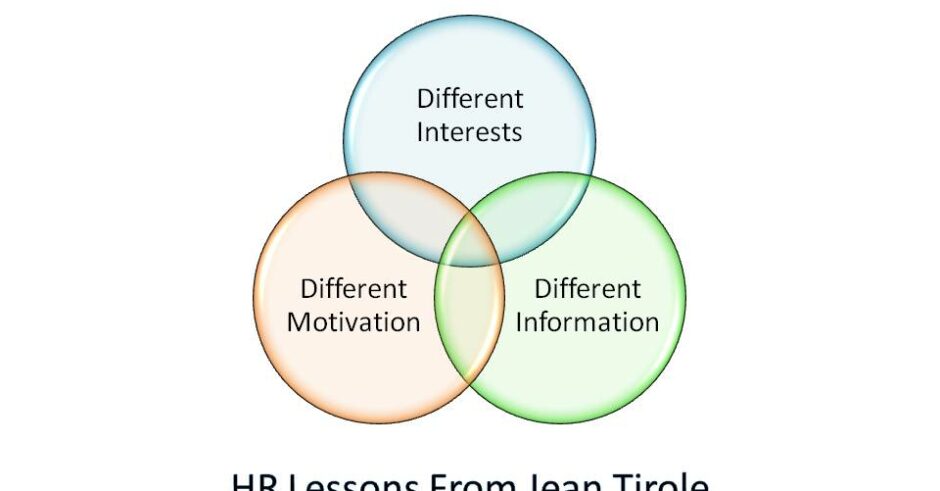Jean Tirole won the Nobel Prize of Economy 2014 “for his analysis of market power and regulation”. This man born in Troyes, France, the city where I studied my BA, is now working at “Toulouse 1 Capitole University, Toulouse, France “.His work reveals the importance of the human psychology in the world of business.
So far, the classical vision of the market could not fully explain the creation of inefficient organizations. The companies’ life is more complex than what we hoped. While the model of Ford made sense in his time, it cannot apply to today’s market. The jobs performed earlier were far simpler than the current ones. Almost no one needed to be computer skilled 30 years ago. Now, no one can survive in the working world without a minimum of IT knowledge.
Looking at the evolution of the market one could think that organizations lost their rationality or worth that they never had it. Jean Tirole proves us all wrong. There are few things that HR professional should learn from his work.
First of all, we are rational but we usually play different roles with different interests. This means that during an interaction our decisions are based on what we know, what we think we know, what we want and our interest. We may work for the same company or same goal but our needs may vary. This difference in interest will impact the way we interact with one another in the organization. An employee may hide a mistake to his boss because his interest is to keep his job. A boss may avoid giving bad feedback because he wants to keep a cool image in the heart of his subordinates.
Second, there are internal and external motivations. On one hand, our intention to perform certain actions is influenced by internal motivation such as the desire to be promoted, to get along with our colleagues, or to preserve a positive self-esteem. On the other hand, external motivation will induce us to behave a certain way. For example, the existence of a sanction for people who arrive late at work will influence their behavior. The creation of transparency rules will also impact the way people deal with information. Organizations have the capacity to modulate the external motivators for their employees. Sometimes a sanction meant to reduce a kind of action, will in fact increase it. Organizations should then anticipate the type of reaction on motivator can have.
Third, we have access to different information; this is called the information asymmetry. The IT expert has obviously more knowledge and information about computers than the HR person, unless being educated about it. This asymmetry of information is the cause of many misunderstandings and lack of communication. The jargon used in each specialty makes the communication difficult or inexistent. Sometimes we compare it with foreign languages. Information asymmetry is not reduced to that. It can also relate to information that one side has and the other one not. This information asymmetry has a huge impact on final decisions. There are groups’ exercises where one side of the negotiators knows more than the other one. They can decide to keep it for themselves, and then have an advantage, or share it with the other team in order to take a decision that will maximize the outcomes for both sides.
Those three factors: rationality with different interests, internal and external motivation and the information asymmetry when taken as a whole can explain why organizations become inefficient. This implies the existence of power games in the organization with people using their power to satisfy their interests, motivations and need of information.
Jean Tirole pointed out very important factors in organizations’ life which are the existence of personal interests, motivation and access to information. This can be referred to the study of decision making, group dynamics and leadership.
My question is: What can we do as HR professional to avoid the pitfalls of those three decision-making factors? My first reflections lead me to the following idea: Organizations are made of individuals with different interests, motivations and information (IMI). The role of HR is to create bridges between individuals IMI, in a way that individuality is respected while helping the organization grow as a whole.
A first step, is to acknowledge the existence of individuals, groups and organizations IMI. The second one, is to understand the dynamics between those three factors. Then, we will be able to create organizations which take advantage of individuals IMI to become efficient.
Yet, the HR and Organizational Sciences spheres have been working on answering some of the questions mentioned earlier. Our role is to focus on the human aspect of business and not consider employee as resources but has a capital part of the organization.
Source: http://www.nobelprize.org/nobel_prizes/economic-sciences/laureates/2014/tirole-facts.html
Author: Anne-Cécile Graber
Master in Organizational Science
The George Washington University
www.organizationalmanagment.blogspot.com
www.hrtn.tv | @AnnapurnaHR | #HRTN

